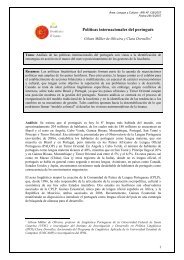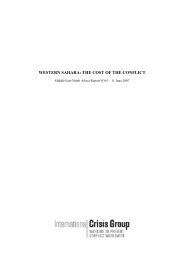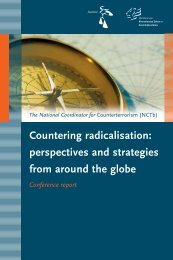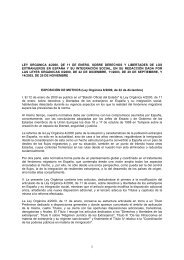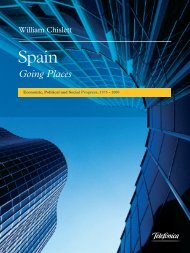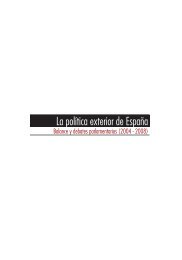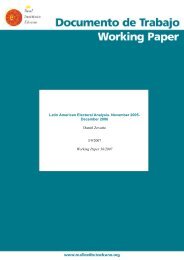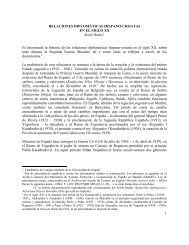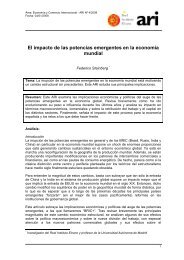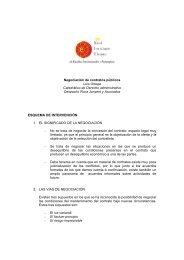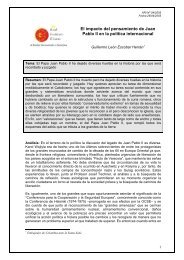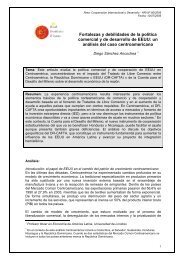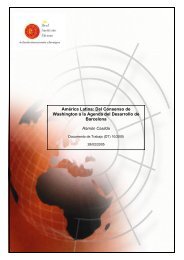Spain and the United States - Real Instituto Elcano
Spain and the United States - Real Instituto Elcano
Spain and the United States - Real Instituto Elcano
Create successful ePaper yourself
Turn your PDF publications into a flip-book with our unique Google optimized e-Paper software.
CULTURAL RELATIONS, IMAGE AND ANTI-AMERICANISM 113<br />
William Fulbright), which guaranteed Spaniards during <strong>the</strong> Franco dictatorship<br />
(1939-75) an impartial selection process <strong>and</strong> Americans <strong>the</strong> necessary<br />
protection to move freely through <strong>the</strong> maze of archives <strong>and</strong> libraries<br />
throughout <strong>the</strong> country. The Commission Board in <strong>Spain</strong>, comprising<br />
Spaniards <strong>and</strong> Americans, remains an independent policy-making body <strong>and</strong><br />
completely free of political interference. Most grantees from <strong>Spain</strong> in <strong>the</strong> first<br />
decade of <strong>the</strong> programme were in <strong>the</strong> fields of <strong>the</strong> physical <strong>and</strong> social sciences.<br />
While Spaniards who went to <strong>the</strong> <strong>United</strong> <strong>States</strong> as “Fulbrighters” found a<br />
democratic <strong>and</strong> ethnically diverse society, <strong>the</strong> first Americans who came to<br />
<strong>Spain</strong>, such as <strong>the</strong> distinguished historians Gabriel Jackson <strong>and</strong> Edward<br />
Malefakis, found a very poor country with no political freedom.<br />
As a result of <strong>the</strong> 1976 Treaty of Friendship, Defence <strong>and</strong> Cooperation<br />
between <strong>the</strong> <strong>United</strong> <strong>States</strong> <strong>and</strong> <strong>Spain</strong>, one year after <strong>the</strong> death of General<br />
Franco, more money was made available to <strong>Spain</strong>’s Fulbright programme, <strong>and</strong><br />
in <strong>the</strong> 1980s two Spanish banks began to sponsor a large number of grants<br />
(later followed by o<strong>the</strong>r companies). The Socialists, who ruled <strong>Spain</strong> from<br />
1983 to 1996, had several “Fulbrighters”, notably Javier Solana, who was three<br />
times a minister before becoming Nato’s Secretary General (1995-99) <strong>and</strong><br />
since 1999 European Union Foreign Policy Chief, as did <strong>the</strong> centre-right<br />
Popular Party (1996-2004), among <strong>the</strong>m Pilar del Castillo, <strong>the</strong> education<br />
minister. O<strong>the</strong>r notable “Fulbrighters” are Pascual Maragall, <strong>the</strong> Socialist<br />
prime minister of <strong>the</strong> region of Catalonia, José Borrell, <strong>the</strong> Socialist president<br />
of <strong>the</strong> European Parliament, <strong>and</strong> Miguel Sebastián, <strong>the</strong> chief economic advisor<br />
to Prime Minister José Luis Rodríguez Zapatero. According to María Jesús<br />
Pablos, <strong>the</strong> executive director of <strong>the</strong> Fulbright programme in <strong>Spain</strong>, “a strong<br />
case can be made that <strong>the</strong> changes that have taken place in <strong>Spain</strong> over <strong>the</strong> last<br />
30 years were influenced, if not shaped, by <strong>the</strong> efforts of those who studied in<br />
<strong>the</strong> <strong>United</strong> <strong>States</strong>, <strong>the</strong> majority of whom had Fulbright grants.”<br />
More than 7,000 grants have been awarded in 46 years, 70% of <strong>the</strong>m to<br />
Spaniards (see Exhibit 6.5). The Commission awards around 100 grants a year<br />
to Spaniards <strong>and</strong> an average of 60 for US citizens. The main sponsor is <strong>Spain</strong>’s<br />
Ministry of Education, followed by <strong>the</strong> US Department of State <strong>and</strong> <strong>the</strong><br />
Ministry of Foreign Affairs. Private sponsorship comprises 20% of <strong>the</strong> annual<br />
budget, with 85% of this amount being spent directly on grants. <strong>Spain</strong>’s<br />
programme today is <strong>the</strong> third-largest in <strong>the</strong> world after Germany <strong>and</strong> Japan in<br />
terms of <strong>the</strong> budget allocated <strong>and</strong> <strong>the</strong> number of scholars going to <strong>the</strong> <strong>United</strong><br />
<strong>States</strong> every year.



